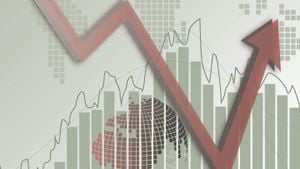The 2025 German Federal Elections on February 23, 2025, have delivered startling results, showcasing significant changes for the country’s political theatre. The Christian Democratic Union (CDU) and Christian Social Union (CSU), led by Friedrich Merz, emerged as clear winners with around 29% of the vote, according to the first exit polls.
The Alternative for Germany (AfD) party, recognized for its far-right stances, experienced historic gains, capturing approximately 19.5% of the votes – nearly doubling its previous performance. Meanwhile, the Social Democratic Party (SPD), under the leadership of outgoing Chancellor Olaf Scholz, faced dire consequences, suffering its worst electoral outcome with just 16% of the vote. Joining this political restructuring, the Greens managed to secure 13%, and the Left Party (Die Linke) attained about 8.5%.
The electoral participation was exceptionally high, with turnout rates surpassing 84%, the highest since the reunification of Germany. This leap from the 76.4% recorded during the last election highlights significant voter engagement, signaling potentially shifting sentiments among the electorate.
Scholz tragically acknowledged the defeat, calling it "a historic loss for the SPD," which has been described as "an amara sconfitta" (bitter defeat) with the coalition of SPD, the Free Democratic Party (FDP), and the Greens having been decisively rejected by voters. The SPD's shrinking support raises concerns over future coalition capabilities.
Friedrich Merz jubilantly proclaimed, "The main thing is to create a stable government as quickly as possible. The world outside isn't waiting for us." His emphasis on the urgency of forming a government quickly reflects the pressing issues currently faced by Germany, especially on the global stage.
Conversely, Alice Weidel, leader of AfD, celebrated her party's transformative success, noting, "We have doubled our votes. We are ready to take on responsibility for the country." Despite this monumental gain, Merz has repeatedly ruled out any coalition with the AfD, stating the CDU's commitment to maintaining its distance from far-right factions.
The broader picture of the election results reveals not only the CDU/CSU’s triumph but also the considerable challenges it faces. Should Merz opt for forming a coalition government, he could either align with the SPD for what is termed as the Grand Coalition – albeit with precarious margins – or pursue steadier governance potentially supported by other smaller parties, provided they breach parliamentary thresholds.
The FDP and the newly formed party, spearheaded by Sahra Wagenknecht, may both find themselves on the cusp of missing the 5% mark necessary for entry, complicatively narrowing the options for coalition partnerships for Merz, who desires clarity and coherence moving forward.
Matthias Miersch, the SPD General Secretary, underscored the gravity of these results, explaining, "The traffic light coalition has been rejected," reflecting upon the significant change as moderates within the SPD ponder their political future. The rise of AfD as the largest opposition party marks the dispelling of past political dynamics, challenging traditional structures.
The repercussions of the elections extend beyond parties and leaders; they signify changing sentiments among the German populace. The CDU's integration of new voter bases, including former non-voters and SPD adherents, calls attention to the shifting allegiances, with substantial flows of voters indicating changing expectations and perspectives.
Several discussions are set to ensue surrounding potential coalition formations as Germany steers through this tumultuous transitional phase. Equally, the enduring impacts of the German political environment – one shaped by recent crises and rising movements – will play pivotal roles as all parties recalibrate their strategies and priorities to address not only the domestic needs but also their positions within the European Union.
The elections have fundamentally reshaped the political framework and, as Friedrich Merz assumes the role of the projected next Chancellor, the ensuing dialogues and decisions will be pivotal for the future of Germany and its role on the continent.



